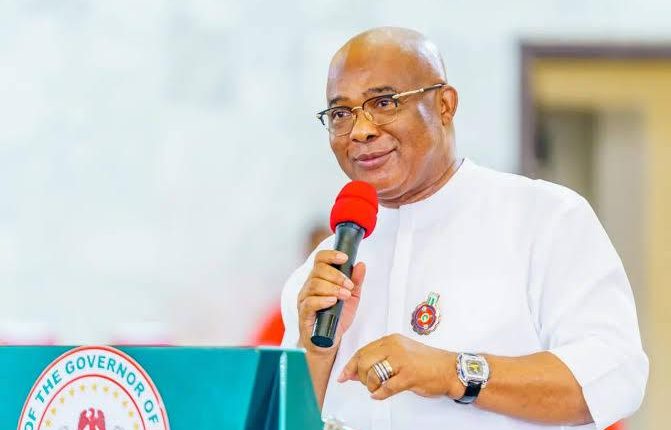Joseph Irikefe
A silent storm appears to be brewing between Okigwe and Owerri senatorial zones over who will succeed Governor Hope Uzodimma of Imo State in 2028.
Already, political leaders from Okigwe zone led by Chief Longers Anyanwu, have petitioned the Imo State Council of Elders, insisting on their turn to produce the governor in 2027.
However, Uzodimma had during campaigns for a second term pledged to cede power to Owerri zone in compliance to the Imo Charter of Equity aimed at facilitating rotational governance among the three senatorial zones.
Sources say powerful figures from Okigwe zone are bent on challenging the charter of equity because former governor, Chief Ikedi Ohakim was denied a second term in office.
The Okigwe zone forces argue that the charter of equity document is undemocratic as it will hand over power to the Owerri zone on a platter even when they allegedly caused the disruption to the rotation of power.
However, Owerri zone political leaders are holding strategic meetings on how to produce Uzodimma’s successor even as local dailies are awash with accusations and counters on the charter of equity document.
Meanwhile, no official contenders have emerged from the zone, but the political landscape is abuzz with rumours of four top politicians poised to throw their hats into the ring.
The Federal Competition and Consumer Protection Commission (FCCPC) has reacted to the skyrocketing prices of commodities, describing the situation as ‘unacceptable’.
This was made known in a statement issued by the Acting Executive Vice Chairman/Chief Executive Officer (CEO) of FCCPC, Dr. Adamu Abdullahi on Wednesday.
According to the statement, the commission acknowledged that it is aware of the concerns expressed by Nigerians regarding the continued rise in prices of goods and services.
“Despite the recent appreciation of the Naira against the dollar, consumers continue to face escalating costs without a corresponding decrease in prices. This situation is unacceptable, and the FCCPC is committed to protecting consumers from exploitation.
“The FCCPC understands the significant financial strain these rising prices are placing on Nigerian households. As a result, the Commission is taking proactive steps to address this issue.
“While the FCCPC cannot directly regulate prices, the Commission will utilise its existing legal framework to enforce fair competition and consumer protection provisions. This includes monitoring and investigating unusual price hikes, addressing complaints filed by consumers, and taking action against any businesses found to be engaging in anti-competitive practices such as price-fixing, price gouging or cartel formation,” FCCPC stated.
The commission revealed that it has directed its operatives to intensify monitoring of both formal and informal markets, where businesses may be taking advantage of market conditions to unfairly inflate prices, and ramp up enforcement activities.
It emphasised that the operatives will be working collaboratively with trade associations, farmer groups, and other stakeholders to identify and remove unnecessary barriers to entry in various sectors, combat price-fixing, and dismantle cartels.
“This will encourage increased competition, ultimately leading to lower prices for consumers. The Commission remains committed to educating consumers about their rights and empowering them to make informed choices. We will engage in advocacy and public awareness campaigns to raise awareness about price gouging and other unfair trade practices and provide guidance on how to identify and report such practices.
“The FCCPC recognises the importance of working alongside other government agencies to tackle this complex issue. We will collaborate with relevant regulatory bodies to develop a comprehensive and coordinated response to anti-competitive practices, price gouging, and other consumer protection issues.”
FCCPC stressed that it is committed to ensuring a fair and comp


